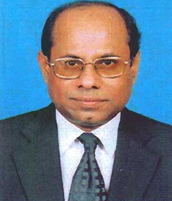Rabindranath Tagore and Bengali Literature
Muhammad Azizul Haque, Ambassador of Bangladesh in Greece
Speech at the Celebration of the 150th birth anniversary of RabindranathTagore, organized by the Embassy of India, Athens, the Hellenic-Indian Society for Culture and Development (ELINEPA) and the Municipality of Chalandri, Thursday, 22 March 2012
 Your Excellency Mr. Tsewang Topden, Ambassador of India to Greece, Honorable Mayor of Chalandri Mr. George Kouzasis, respected President of the Hellenic-Indian Society for Culture and Development (ELINEPA) Dr. Dimitrios Vassiliadis, ladies and gentlemen, kalispera / good evening.
Your Excellency Mr. Tsewang Topden, Ambassador of India to Greece, Honorable Mayor of Chalandri Mr. George Kouzasis, respected President of the Hellenic-Indian Society for Culture and Development (ELINEPA) Dr. Dimitrios Vassiliadis, ladies and gentlemen, kalispera / good evening.
It’s an honor and great pleasure for me to attend this celebration of the 150th birth anniversary of great poet and Nobel laureate Rabindranath Tagore jointly organized by the Embassy of India, Athens, the Hellenic-Indian Society for Culture and Development (ELINEPA) and the Municipality of Chalandri.
Poet Rabindranath Tagore, who was born in 1861, has remained to this day the brightest luminary in the firmament of Bangla literature. It was he and a couple of other poets and writers, including poet Kazi Nazrul Islam and Michael Madhusudan Datta, who together elevated the stature of the Bangla literature to constitute a component of the world’s literary treasure. And by winning the Nobel Prize in 1913, Rabindranath Tagore attracted the attention of the entire world to our extraordinary literary wealth. ‘’Rabindranath Tagore is a light house for the Tagore lovers.” As a light house guides a ship by night to keep to a safe course, so do Tagore’s teachings and philosophy, as expressed through his timeless works, steer one through both adversity and prosperity. Bangladesh and India are the principal co-sharers and proud cherishers of the great and huge creative legacy of Tagore. Both countries are having joint celebrations of the 150th birth anniversary of this great poet. As a Bengalee poet who wrote in his mother language Bangla, Rabindranath Tagore is as much a poet of Bangladesh as he is of India. He was born and also lived all his life in the then huge province of Bengal in India of the British Raj –the Bengal which now stands divided to constitute on one hand almost the entire territory of sovereign Bangladesh and on the other the Paschim Banga or West Bengal state of the present-day-India. Tagore had occasionally visited and stayed in their estate in East Bengal which is now a part of the territory of Bangladesh. He lived there in their house at Shilaidaha located on the great river Padma and often spent several days in a row in his boathouse on the river. These were the places where the great poet came in intimate communion with the common man and nature that engendered the inspiration that was behind the composition of many of his great works. The cultural psyche of our two nations, Bangladesh and India, finds an elaborate reflection in Tagore’s works. Conversely, Tagore’s moral and aesthetic thoughts and his philosophy about life and the world have contributed immensely in molding the psyche of our peoples.
With his prolific and versatile poetic and literary genius, Tagore had made his conspicuous presence felt in every branch of the Bangla literature. He was simultaneously a poet, philosopher, artist, playwright, essayist, songwriter (composer), short story writer, novelist and educator. So, in terms of variety and volume and quality of works, it is difficult to find Tagore’s parallel in the world. Although Tagore wrote successfully in all literary genres, he was primarily a poet. The first Asian to win Nobel Prize in literature, Tagore was awarded the Nobel Prize principally on an assessment of his poetic genius that found an expression through the lyrics in his book Gitanjali (literally meaning Song Offerings), which could be compared to the tip of an iceberg, when you see it against the entire volume of his literary works. Both Bangladesh and India picked their respective national anthems from Tagore songs, which I believe is something unique in the world. His extraordinary works have made Tagore a cultural icon for the entire humanity.
A humanitarian, social and religious reformer, Tagore’s works, especially his poems and songs, are morally edifying and aesthetically elevating. Knowledge of the language Bangla is almost a sine qua non for a deep and full appreciation of Tagore songs and poetry based on a thorough grasp of the beauty of their words and melodies, which remain untranslatable. The words, the message and the music in a Tagore song combine together to forge an enchantment that holds the listener spellbound. Tagore songs have the power to transport the listener to a serene world of unblemished pleasure and exquisite beauty.
So prodigious is the scope of Tagore’s works that it seems to comprehend every possible human emotion and feeling as well as their nuances. His literature expresses Tagore’s deep empathetic understanding of human mind and he upholds universal humanitarian values. He aspired to see the entire humanity bound together with bonds of love, compassion and sympathy. Even 150 years after his birth and 70 years after his passing away in 1941, Tagore dominates our literary and cultural landscapes.
I would like to take this opportunity to thank all the organizers of this celebration. I would also like to express my most sincere thanks to H. E. Mr. Tsewang Topden, Ambassador of India to Greece, for inviting me and giving me this opportunity to speak before this august audience on this great literary genius of ours who still continue –almost a century after his death –to do our countries, Bangladesh and India, proud. I wish this celebration a resounding success.
I thank you all for your kind attention. Efkharisto poly.
Muhammad Azizul Haque
Bangladesh Ambassador to Greece
